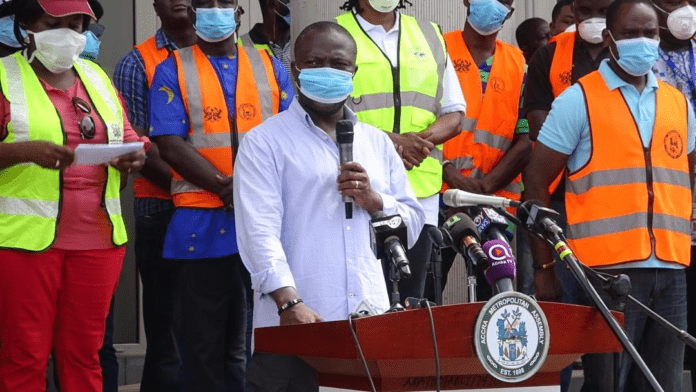
The Accra Metropolitan Assembly (AMA) has launched its Electoral Areas Sanitation Challenge to help present quarterly community-based sanitation assessment report to the public.
The challenge is a citizens’ engagement programme aimed at stimulating and rewarding community participation and ownership of innovative schemes to improve environmental health and sanitation in their respective communities and beyond.
It is aimed at keeping communities clean and highlight the role of community members in ensuring a safe environment.
The programme’s objective is to establish a quarterly status of environmental sanitation in the electoral areas, create a sanitation database for decision making, facilitate investment in sanitation, and promote local ownership of environmental issues.
The Accra Metropolitan Chief Executive, Mohammed Adjei Sowah, at a media briefing, said the challenge was scheduled to commence in June 2020, but it was delayed for a year due to the Covid-19 restrictions.
The assessment of the communities would be based on four thematic areas: Waste Management – 40 per cent, Public Health and Safety – 35 per cent, Innovation in Environmental Sanitation – 10 per cent, and Community Initiated Programmes and Projects – 15 per cent.
Mr Sowah said environmental sanitation was a shared responsibility between city authorities, commuters, residents, businesses, and other stakeholders and the AMA would be transparent and candid in assessing the situation in the various communities.
He said marks would be awarded based on several criteria and parameters under the thematic areas derived from the National Environmental Sanitation Policy, the AMA By-laws and the Accra Climate Action Plan.
“Weighted score for each criterion and parameter depends on impact on environment and public health, numbers of people exposed to possible risk from defect and ease of remedy. The higher the score, the better the performance,” he said.
Mr Sowah said a baseline assessment of the first quarter of 2021 by the AMA technical team prior to the commencement of the challenge revealed that a lot of work was needed in all the electoral areas to improve sanitation and reduce public health risks.
“Electoral areas, from the best to the least performing would be engaged to identify and develop actions to improve environmental conditions. Best performing electoral areas would be motivated in kind to undertake activities to improve their environment,” he said.
“Least performing electoral areas would also be engaged to plan and implement activities for improvement.
“Interventions may include enhanced community engagement, deployment of enforcement task force, and mobilisation of community members including cooperate institutions, among others,” he said.
The MCE called on the media to assist in awareness creation, education and monitoring and to bring up issues that would help achieve the programme’s aim.






